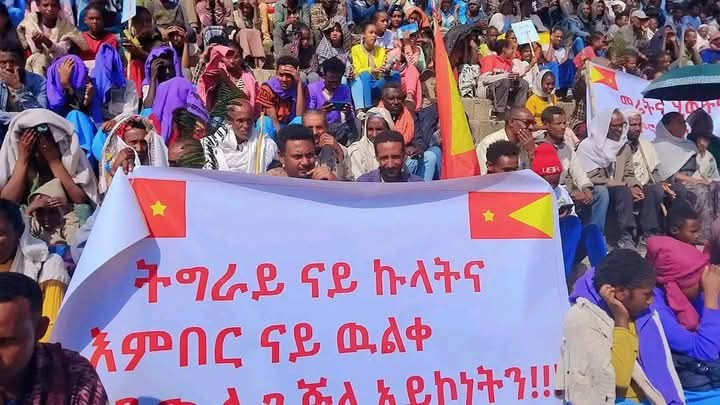Amid growing fears of renewed conflict in northern Ethiopia, residents of Maychew, a town in southern Tigray, held a large anti-war demonstration on Wednesday, voicing strong opposition to any return to violence in the region.
The rally, which included youth, women, and elders, was organized in response to recent statements by a faction of the Tigray People’s Liberation Front (TPLF) led by Debretsion Gebremichael. The group had rejected a decision by Ethiopia’s National Election Board to revoke the TPLF’s legal status and warned of possible military action to “restore Tigray’s sovereignty.”
Demonstrators marched peacefully through Maychew, chanting slogans such as “Our choice is peace” and “We reject any force serving foreign interests,” in an apparent reference to allegations of renewed ties between Debretsion’s faction and the Eritrean government.
Local leaders, including Maychew Mayor Yohannes Adugna and South Tigray Zone Chief Haftu Kiros, addressed the rally. “We must remain vigilant and protect peace at all costs,” said Yohannes, emphasizing that renewed war would only bring further hardship to communities still recovering from the two-year conflict that ended in late 2022.
The rally follows a series of political developments in the region. On May 8, the National Election Board of Ethiopia (NEBE) officially delisted the TPLF from the national party register due to its failure to comply with regulatory requirements. In response, the Debretsion-led faction condemned the move and appealed to the African Union, claiming the decision violates the terms of the 2022 Pretoria peace agreement.
During Ethiopia’s civil war, the federal government designated the TPLF as a terrorist organization. While the Pretoria Agreement brought an official cessation of hostilities, recent tensions and internal political fragmentation have reignited fears of renewed instability.
Adding to the uncertainty, reports have emerged of federal police deployments into the Tigray region to reinforce the protection of infrastructure such as airports, telecommunications networks, and banking institutions.
Community members at the rally also expressed frustration over the politicization of regional leadership and emphasized their desire for stability, local governance, and development. Many carried banners denouncing “warmongers” and calling for unity among Tigrayans to defend peace.
As Ethiopia navigates a fragile post-war transition, the voices from Maychew reflect a growing grassroots demand for nonviolence and local autonomy—setting the tone for what many hope will be a future shaped by reconciliation, not renewed conflict.



